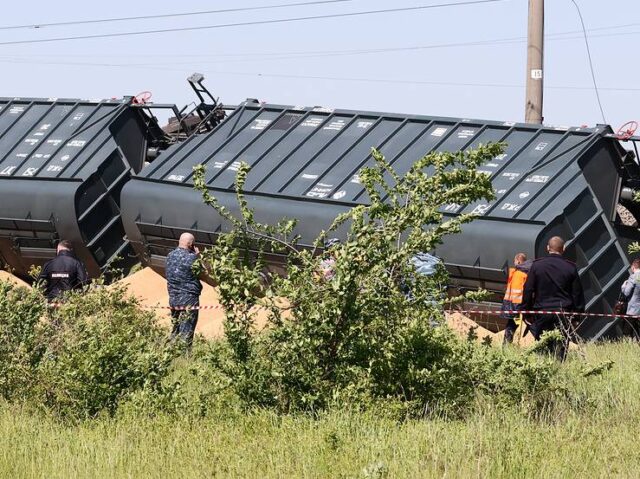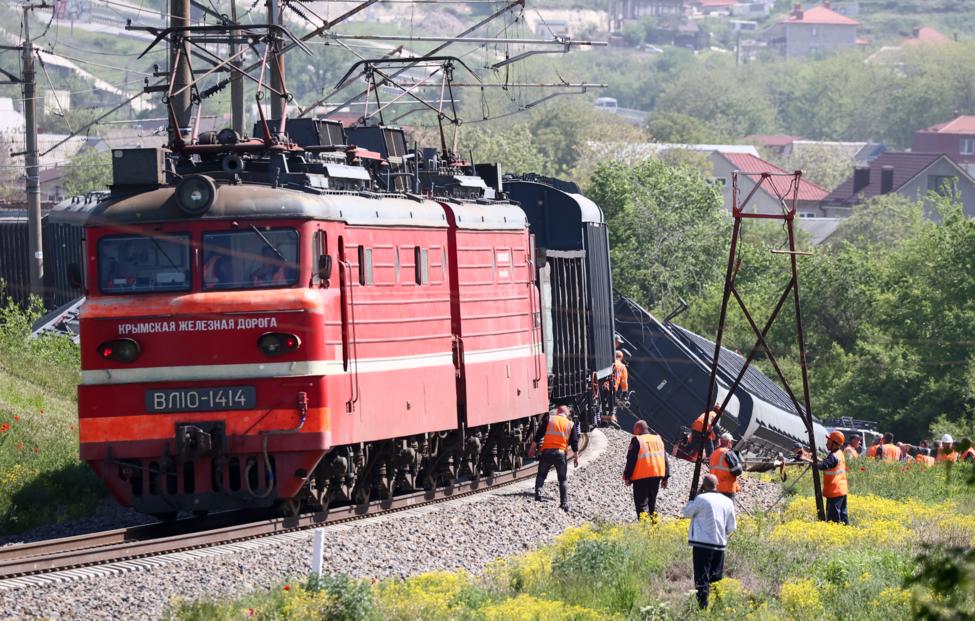Another embarrassment for Russia as, just days after it boasted of having stopped rail sabotage by deploying its fleet of armoured trains, another track was blasted causing a train to plunge down an embankment.
Eight rail cars of a grain shipment in occupied Crimea near the village of Chistenkoye were derailed on Thursday, with reports claiming a bomb blast under the train destroyed the tracks the train was running on, causing the wagons to topple down the side of the embankment. Photographs of the scene of the bombing on social media show mounds of grain spilt from the cars as workers try to clear the line.
The fact the blast struck the centre of the train rather than the engine suggests a range of scenarios, including that the explosive device was detonated locally by an observer, or that saboteurs are using time-delay fuses.
The line, which has strategic importance as it links Russia’s Black Sea naval base at Sevastopol with the hinterland, was been totally blocked to traffic, the Ukrainian government said, and over 160 feet of track needs repairs. A spokesman of Russia’s occupation regime in Crimea said rail replacement buses would be laid on for passengers in the meanwhile and vowed to have the line re-opened within 24 hours.
The British Ministry of Defence said there was strategic significance to the blast, saying in a statement taking out that rail line could potentially disrupt the supply of weaponry to Russia’s Black Sea Fleet, including the Kalibir missiles which are fired from naval vessels against Ukrainian cities. “Any sabotage in this sensitive area will further increase the Kremlin’s concerns about its ability to protect other key infrastructure in Crimea. The peninsula retains a vital psychological and logistical role in enabling Russia’s war in Ukraine”, said Britain.
The blast under the tracks was caused by “unauthorised individuals”, said Russia — Ukrainian saboteurs, in other words — and said it would need to strengthen “anti-terrorist security measures”.
The Chairman of the State Council of Crimea — the collaborator administration which has worked with Russia in occupied Crimea since 2014 — Vladimir Konstantinov said the railway had been “undermined” by “the tricks of the Ukrainian Nazi team”.
Ukraine for their part have not officially claimed responsibility for this, or many other acts of rail sabotage against Russia in recent weeks, often choosing to leave the authorship of blasts up to speculation. In other cases, the Ukrainians claim infrastructure explosions may be down to a domestic Russian resistance trying to take down the Putin regime.
The major derailment comes just days after Russia, thorough its state propaganda channels, boasted that it had managed to stop Ukrainian sabotage of its railways by deploying armoured trains. While a relic of another century for every other country on earth, Russia has four armoured trains in commission, used to keep its enormous network of railways open, an essential task for a nation that relies on rails to move tanks and military supplies fast.
Railway Troop leader Lieutenant-General Oleg Kosenkov claimed last week: “the special trains successfully repelled all the attacks by subversive/reconnaissance groups of Ukrainian armed formations, inflicting heavy losses on the enemy”.
This hopeful claim came, perhaps, in response to comments by the British Ministry of Defence that a series of successful bombings of Russian railways proved the country was unable to protect its crucial-to-the-war-effort network.


COMMENTS
Please let us know if you're having issues with commenting.